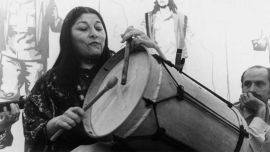Migdely fled from Venezuela with her baby after the death of Ginyveth, her wife, terrified by the risk of losing custody without the protection of laws recognising gay marriage or parenthood.
Migdely Miranda and Ginyveth Soto married in Argentina in 2013 and had a baby via artificial insemination. Shortly afterwards they returned to Venezuela, where Ginyveth was murdered in late 2014, a victim of the rampant crime in the crisis-stricken country.
"I couldn’t even decide what I wanted for my wife’s body, if I wanted her to be cremated or buried,” recalls Migdely, looking back.
“I didn’t even have access to the morgue in order to see her. It was as if I was a complete stranger," she says, speaking in Buenos Aires, where she migrated in 2015 with her baby son, now aged six.
She remains locked in a legal battle with Ginyveth’s parents, who never accepted the couples’ union.
"There were many threats, denunciations and a legal procedure whereby the parents of my wife were requesting to keep my boy," says the 37-year-old.
Venezuela lags behind the rest of the Latin American region when it comes to the rights of the LGBTI (lesbian, gay, bisexual, transgender, intersex) population.
The LGBTI community in the country is now pressing for Venezuela’s new Parliament to debate a gay marriage law this year but they have only encountered resistance in this highly conservative country.
"It’s not a fetish" but the gateway to "systematically" denied rights, says activist Haischel Escorche, 44, in the council housing flat she shares in Caracas with her partner María Palacios, whom she affectionately calls ‘Kika.’
The debate goes beyond assets, underlines Haischel. It should include "adoption, family and deciding what to do with your partner’s body if she dies or decides upon [medical] treatment."
Political will?
Argentina was a pioneer within the region when it legalised gay marriage in 2010, giving homosexual the rights to adopt and undergo assisted reproduction treatment as used by Ginyveth and Migdely, transplanting the fertilised egg from one to the other.
Countries like Uruguay, Brazil, Colombia and Mexico in part (15 of its 32 states) have followed in these footsteps.
"To wed in my country is my right," read a poster in a recent Caracas demonstration in front of Congress.
Although the Venezuelan Constitution of 1999 still establishes that the state "protects" matrimony "between a man and a woman," the Supreme Court ruled in 2008 that this "neither prohibits nor condemns de facto unions between persons of the same sex." And in 2016 they determined that parenthood within such families should be "protected."
But the National Assembly has yet to legislate.
"They are discriminating against us by omission. We [as a people] do not deny nor condemn but nor do we affirm the rights of the LGBTI population," denounces transexual lawyer Richelle Briceño, who asks for "political will."
Heischel says that she has come to feel "invisible."
Before the parliamentary elections last December 6 when the ruling party won a landslide amid denunciations of fraud and an opposition boycott, President Nicolás Maduro called for gay marriage to be debated.
But the Venezuelan leader later said it was not a "priority" given the country is suffering a devastating crisis.
‘A different life’
LGBTI activists have met up with the parliamentary Committee for Social Development but there have been no substantial advances in a mostly Christian country with Catholicism as the main religion and Protestant and evangelical creeds gaining ground.
Alfonso Campos, an evangelical pastor and deputy who says he defends traditional marriage, alleges that a gay marriage law would require a constitutional amendment, which would in turn necessitate a referendum.
"You don’t consult about rights," responds Kika.
The obstacles come from high-ranking figures. In a television interview Deputy Speaker Iris Varela rejected matrimony for homosexuals, proposing "asset-sharing" as an alternative.
Denied Ginyveth’s inheritance, Migdely recalls tough times during her first months in Argentina when her money did not suffice to buy her baby "sufficiently warm clothing" in winter.
She deplores the legal vacuum leaving her child unprotected, denying it "a different life, I don’t know if for better or worse."
by Esteban Rojas with Nina Negrón in Buenos Aires, AFP

























Comments